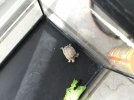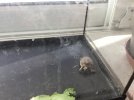Hello all,
I live in Greece near Athens and about a month ago a very young wild tortoise was found in my school. The students took it in and paid attention to it for about a month and then started ignoring it. Hoping to do the right thing I took permission and took the tortoise and brought it home.
I know wild tortoises should not be pets but it is so young that leaving it on her own is a certain death sentence . We commonly find empty turtle shells around my house killed by most likely magpies.
I hope and plan to eventually get it in a wildlife center but until then how should I take care of it. Does anyone know if it is a Herman’s or a Greek tortoise?
Thanks


It is currently in a small 12lt aquarium happily devouring a piece of lettuce.
I keep aquariums and have a bit of gear but Indont know how much of it will be helpful
I live in Greece near Athens and about a month ago a very young wild tortoise was found in my school. The students took it in and paid attention to it for about a month and then started ignoring it. Hoping to do the right thing I took permission and took the tortoise and brought it home.
I know wild tortoises should not be pets but it is so young that leaving it on her own is a certain death sentence . We commonly find empty turtle shells around my house killed by most likely magpies.
I hope and plan to eventually get it in a wildlife center but until then how should I take care of it. Does anyone know if it is a Herman’s or a Greek tortoise?
Thanks


It is currently in a small 12lt aquarium happily devouring a piece of lettuce.
I keep aquariums and have a bit of gear but Indont know how much of it will be helpful